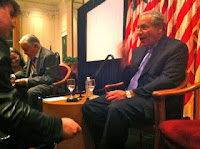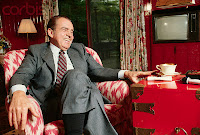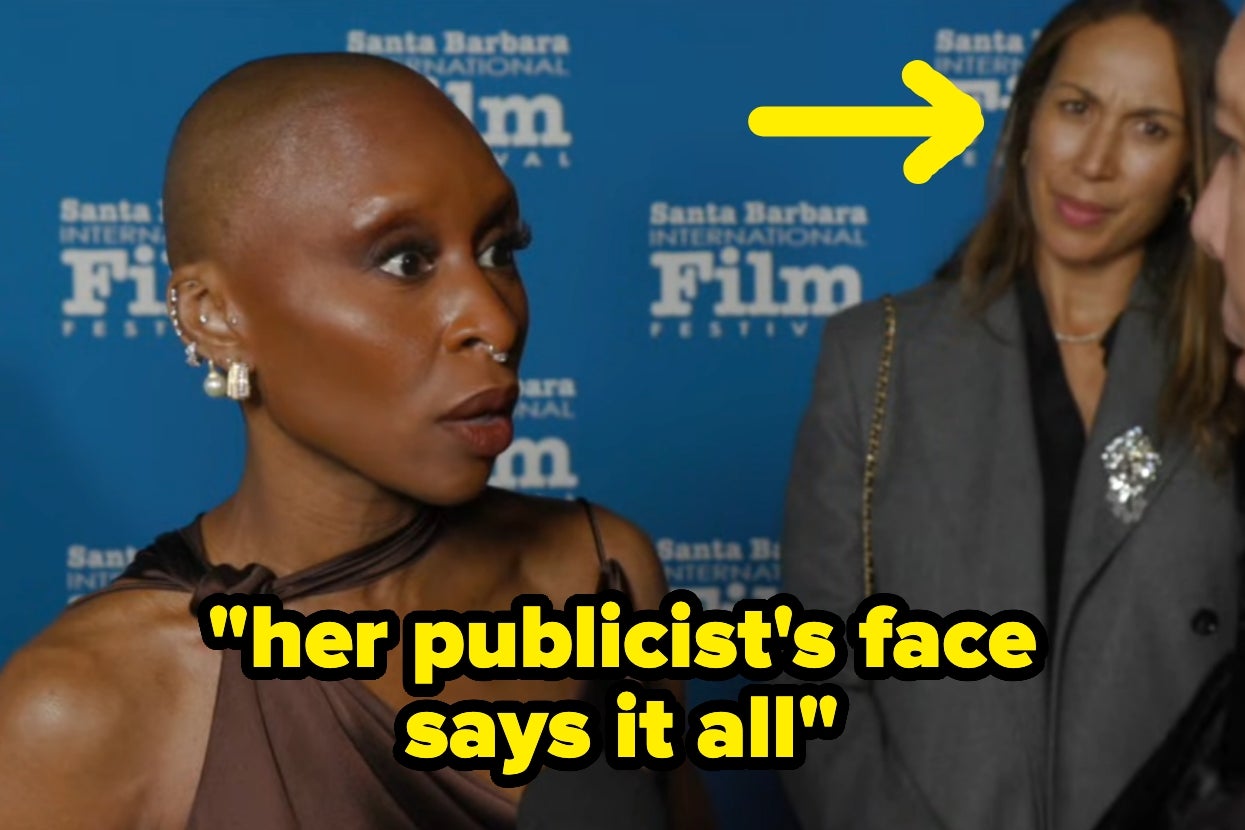
Tim Naftali, the former director of the Nixon library, has enough of secular outlook that he didn't know (or perhaps jokingly claimed not to) that he had inherited his surname from one of Jacob's fractious sons. Still, his Yorba Linda years comprised a wilderness experience of Hebrew Testament proportions. As he sometimes reminded me, I was the one who first beckoned him into the trackless wastes. I also helped give him his toughest challenge: Replacing the private library's
relentlessly pro-Nixon Watergate exhibit. I'm sorry about the times I made his work unnecessarily difficult and grateful that he beat disgraced Nixon chief of staff Bob Haldeman's boys and finished what history had called him to do.
No public historian since the Enola Gay controversy at the Smithsonian Institution had a harder challenge. He was uniquely qualified for it. He was a highly regarded, non-ideological scholar of Nixon's defining crisis, the Cold War. A few years before he came to Yorba Linda, Tim and I had worked together a little on presidential tapes, by which Nixon's historical reputation is utterly bound and tied, for better and worse. Tim wasn't a Nixon booster, and I think he ended up deeply discouraged about Nixon's character as a result of his forced curatorial march through the Watergate swamp. Yet he and the last elected moderate Republican president would have disagreed on relatively few domestic or foreign policy issues. Perhaps most important given the odds he faced, he displayed the quality Nixon prized most of all. It turns out that Tim Naftali was tough as hell.
The archivist of the U.S., Allen Weinstein, was so excited by the idea of making Tim our first federal director (the library opened in 1990 as a private institution) that he offered him the job a few days after my call. When things were going well at the library, Weinstein would stress that Tim was his man.

When things got rocky, he'd remind me that it had all been my idea. Tim and I labored together for over three years, rarely disagreeing about substance but having a series of pitched battles about Tim's independence vs. the Nixon foundation's right to be consulted on exhibits and programs, space use on our shared campus, and even Tim's lower-case library logo, which he thought invoked the '60s and '70s, when Nixon was president, but we thought unstatesmanlike.
We got important work done anyway. I permitted him to open foundation-owned records to scholars and funded his oral history interviews with Nixon policy heavyweights and White House operatives. Our disagreements never became public nor interfered materially with our shared mission of establishing the federal Nixon library as the successor of a private museum and archive that had earned something of a reputation of partisanship (which, if it was a fair criticism, was no one's fault but mine). Tim's bosses at the National Archives fully embraced the same mission --

Weinstein, of course, and his deputy
Sharon Fawcett, who had both worked hard to bring Nixon's library in from the cold.
Having
bargained with them for hundreds of hours to launch the federal library, Kathy O'Connor (shown here with Fawcett), Nixon's longtime aide and last chief of staff, and I would sometimes call or write Weinstein and Fawcett to complain about Tim. We never got anywhere. They backed him unequivocally. The most I could pry out of the avuncular Weinstein was his theory that Tim and I were brothers at heart who clashed because of unacknowledged similarities in temperament and outlook. After we each had stated our grievances, he would smile and send us back to Yorba Linda to work it out. While I never fully accepted that I was Dan to Tim's Naphtali, Kathy and I both loved Tim's mother, Marjorie, a delightful Anglican from his home town of Montreal (Tim's late father, a builder, was Jewish). One problem may have been that I was having trouble letting go after spending two decades planning and running the library. By the same token, we felt that Tim, in his actions and public statements, was trying too hard to put distance between himself and the
ancien regime, namely us.
We didn't become close until I left to begin full-time ministry in February 2009, which, now that I think about it, is often the way with siblings.
Thanks to Kathy, my able successor as head of the Nixon foundation, relations with Naftali and
NARA quickly improved. But her journey toward the promised land of happier collaborations with our federal colleagues
was interrupted and cruelly ended by the Haldeman renaissance. After Tim invited Nixon White House counsel John Dean to give a speech in June 2009, Nixon's White House and
CREEP aides (including some involved in Watergate or Watergate-related activities) and their friends, thanks to enablers on the foundation board, surged to positions of influence or even fiduciary authority.
They were wrong about Dean's appearance, which was inevitable and also appropriate as part of the library's transition to public control. The self-described lynchpin of Watergate, he is pivotal historical figure. Tim and we had already played host to Watergate reporter Carl Bernstein. Bob Woodward
visited in 2011 without incident or controversy. The actions of Haldeman's acolytes weren't based on what was best for the library, the public, or Nixon's reputation. They lashed out because they despised Dean for helping send fellow operatives to jail for Watergate crimes and then grasped for power because they believed it was their right and their turn. As Naftali told the
Los Angeles Times, "It's a very special tribe that has never accepted the nation's verdict on Watergate."
By the fall of 2009, Tim had been at work for two years on the library's new Watergate exhibit, which Weinstein and Fawcett had ordered him to undertake, also
at my suggestion. It was part of complex deal in which the feds paid millions to build an archives wing for Nixon's vast collection and agreed to take over the library in May 2007 and move the records from College Park, Maryland. Shaking hands with our federal partners, we and the Nixon foundation board had promised both our acquiescence in an exhibit that would be acceptable to historians and in library-controlled public programming, including appearances by Nixon critics.
But once under the control of Haldeman's tribe, Nixon's foundation broke its promises. Most of their
harsh if ultimately impotent actions are part of the public record. They denounced Naftali publicly for inviting Dean. An operative wrote on the foundation web site that he should go run a museum for traitor Alger Hiss. They recruited Sen. Lamar Alexander (right), a former Nixon aide, to put a
secret h old
old on the nomination of a new U.S. archivist to pressure or get rid of Naftali. They assembled a Watergate truth squad including convicted perjurer Dwight Chapin and
attacked Tim's Watergate exhibit draft, calling for friendlier treatment of Haldeman and trying to
prevent the public from seeing videotape in which operatives discussed
dirty tricks and
counting Jews in the federal government. A former foundation employee who'd opposed the
NARA handover wrote a column associating Tim with "the left." Another operative filed a
FOIA request to read Tim's e-mails. Yet another accused him publicly of sending coded signals about his sexual orientation. His wife
publicly accused Tim of leaking prejudicial Nixon tapes to the media.
When Tim offered one of Nixon's daughters a tour of the library's new quarters, she accepted only to denounce him in front of her fellow foundation leaders and demand that he leave. He was shocked that his adversaries had gone that far. As
I had learned over a decade before, when Nixon put me instead of his family in charge of his estate, the withdrawal of the favor of political offspring is a powerful weapon. Lucky for Tim, it's not quite as potent when the taxpayers rather than the offspring are paying your salary. Though the massive assault on his professionalism and character must've been upsetting and sometimes dispiriting, it can't help but have reassured Tim that he was on the right track.
Besides, his colleagues at
NARA must've had his back. Officials in Washington and around the country, especially at other libraries, had to be aware of what he was up against as he did the difficult job the archivist of the U.S. had given him. When all Nixon's men went to war against a federal director in the last battle of Watergate, the blue coats would obviously know where their loyalties belonged.
Not so much, astonishingly. At some point, the Weinstein-Fawcett hard line weakened. After the public learned of the Haldeman truth squad's critique in the late summer of 2010, there were signals from Washington that it was receiving a respectful review. That's right: The National

Archives, custodian of documents signed by Thomas Jefferson, was paying serious attention to a Watergate narrative co-signed by Dwight Chapin.
And it gets worse. I remembered Weinstein and Fawcett's stony imperviousness to Kathy's and my minor complaints as I read
historian Maarja Krusten's reference to Tim being cussed out not by a Haldeman operative or Nixon family member but by one of his fellow presidential library directors. Someone had figured out how to reach deep into the government and enlist a taxpayer-paid
NARA official for a flanking attack on Tim Naftali. Which director was it? What was the official trying to accomplish? Was it part of an effort to get Naftali out of the Nixon library or alter the content of the Watergate exhibit? Did top
NARA officials know about or sanction it?
It's hard to imagine Barack Obama's new archivist, David Ferriero, doing so, especially after the senior senator from Tennessee held up his nomination. Besides, I agree with Krusten that he's a stand-up dude. As for Fawcett, I'd always found her to be a straight shooter

. But we know from
press reports late last year that she'd sided against Naftali and that the Nixon foundation offered her a consultancy after her retirement. All the library directors, including the one who dissed Tim, had reported to her. It's also important to know if Haldeman's operatives played a role. In 2009, the Nixon foundation tried unsuccessfully to get the other presidential foundations to join it against Naftali. Lamar Alexander isn't the only current or recently serving government official with ties to the Haldeman clique.
However it happened, a federal official with a six-figure salary was carrying Watergate for Nixon's men. Maybe this inside move against Naftali was just further proof (as if it were needed) of the wisdom of the scriptwriter who put the words "follow the money" in Watergate leaker Mark Felt's mouth in "All the President's Men." Krusten writes that the director told Naftali, "You're going to ruin it for the rest of us." Perhaps he was speaking on behalf of cash-strapped presidential libraries from Simi Valley to Boston, where
private foundation money can still buy a considerable amount of hagiography for the entertainment of credulous museum-goers. Too many
balanced and thorough museum exhibits -- torture, Monica Lewinsky, Iran-contra -- and the gravy train might dry up as
ex-presidents' rich friends tire of underwriting an undesirable degree of objectivity. For creating (and in March 2011
successfully opening) the Watergate exhibit that his bosses and historians had demanded and that the public deserved instead of the one Dwight Chapin wanted, Tim Naftali had become the ultimate skunk in the Rose Garden.
 Jefferson Morley on the CIA's Watergate connection:
Jefferson Morley on the CIA's Watergate connection:































